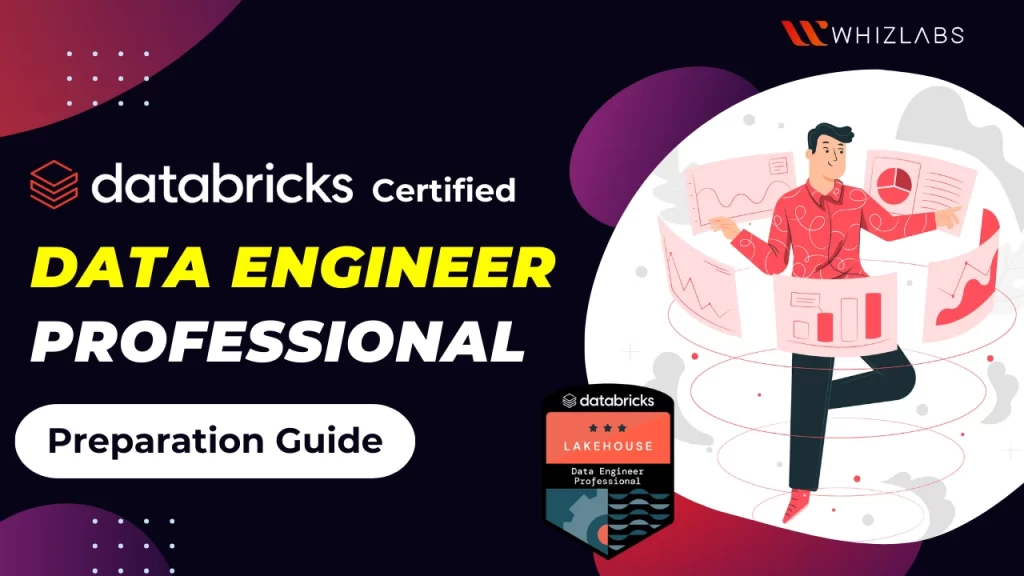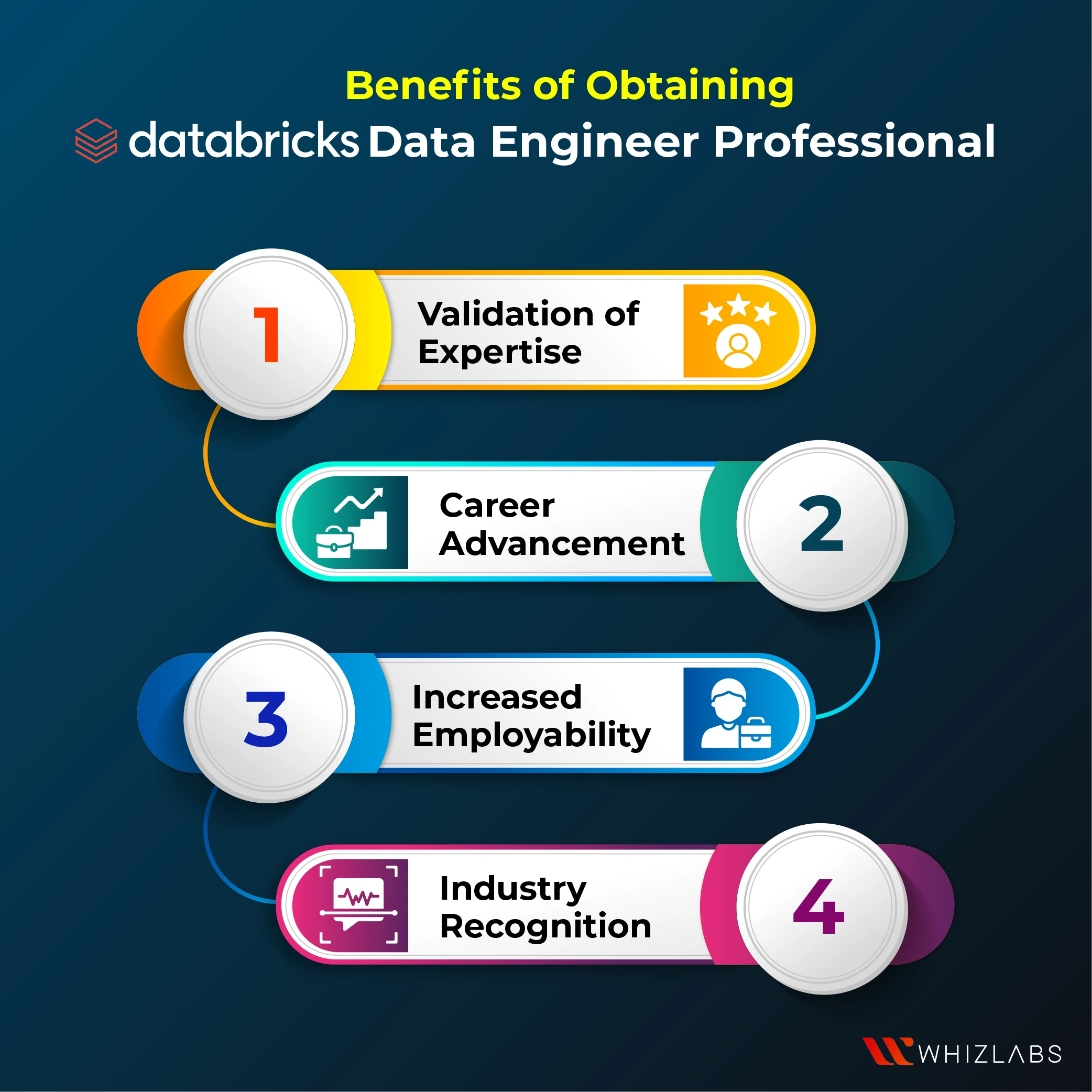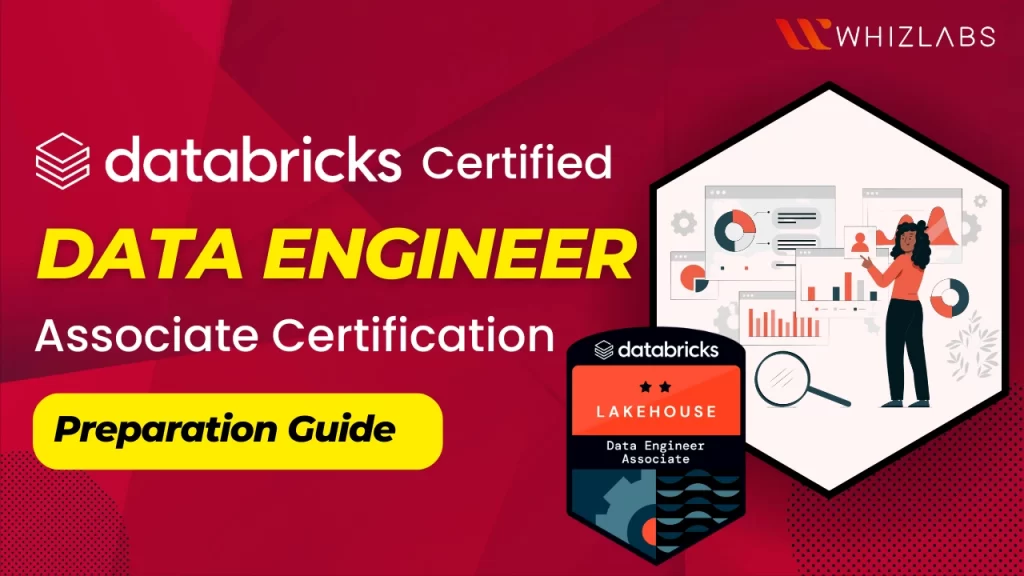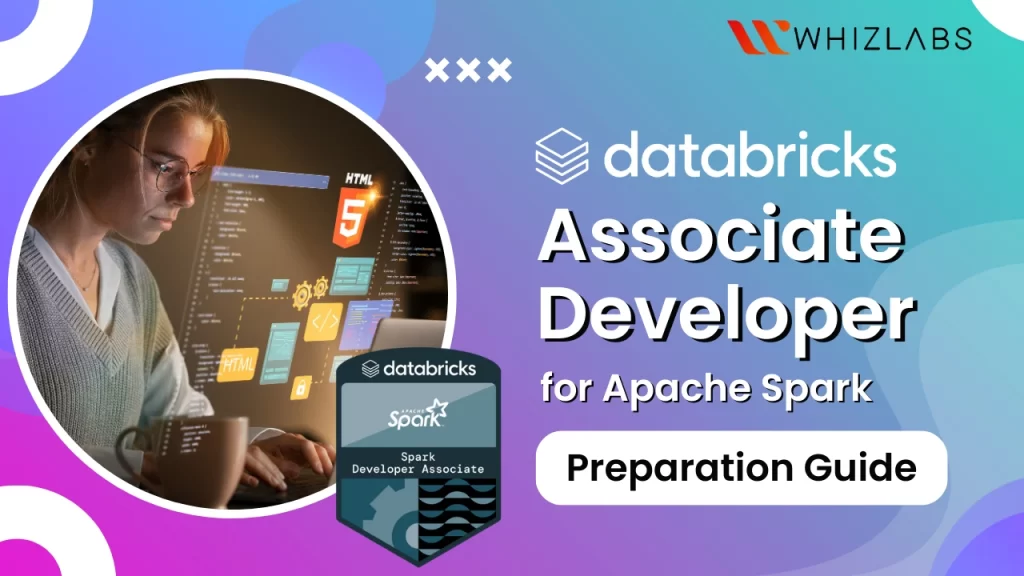Are you planning to pursue the Databricks Certified Data Engineer Professional Certification? If so, it’s essential to dedicate time to develop a well-structured preparation plan for success.
The Databricks Certified Data Engineer Professional Certification is designed for individuals who seek to showcase their expertise in utilizing the Databricks Lakehouse Platform for advanced data engineering tasks.
The blog post covers the critical aspects of Databricks Data Engineer Professional Certification, such as outlining the required skills, identifying the target audience, detailing the exam syllabus, recommending study resources, and providing valuable tips to excel in the exam.
Let’s dive in to know more:
About Databricks Certified Data Engineer Professional Certification Exam
Databricks Certified Data Engineer Professional Certification is intended for Professionals. After becoming a certified individual, you can perform whatever advanced data engineering task you have been assigned.
Taking Databricks Certified Data Engineer Professional certification can help to acquire the following skills and knowledge as follows:
- How to model data management solutions on Databricks Lakehouse
- How to build data processing pipelines via Spark and Delta Lake APIs
- How to use the Databricks platform and its relevant tools
- Crafting production pipelines with the usage of security and governance best practices
- Monitoring and logging production jobs
- Best practices for applying the code on Databricks
What are the skills you will gain from the Databricks Certified Data Engineer Professional Certification exam?
Databricks Certified Data Engineer Professional evaluates an individual’s proficiency in utilizing Databricks to carry out advanced data engineering tasks.
Also, this certification assesses a comprehensive understanding of the Databricks platform, as well as proficiency in developer tools such as Apache Spark, Delta Lake, MLflow, and the Databricks CLI and REST API. Moreover, the exam assesses the capability to model data within a Lakehouse framework, drawing upon general data modeling principles.
Also, it evaluates the capacity to ensure the security, reliability, monitoring, and testing of data pipelines prior to the deployment. Besides, the Databricks Certified Data Engineer Professional Certification focus on the following skills:
- Databricks Tooling (20%): This part is all about learning how to use the tools in Databricks, like figuring out how to get around and make the most of what’s available.
- Data Processing (30%): Here, you’ll learn how to work with data, like getting it ready, shaping it, and making it useful for analysis.
- Data Modeling (20%): Think of this as organizing data neatly so you can understand it better. It’s like putting things in order before you start using them.
- Security and Governance (10%): This is all about keeping your data safe and following the rules for doing so.
- Monitoring and Logging (10%): In this part, you’ll learn how to keep an eye on what’s happening in Databricks and keep everything running smoothly.
- Testing and Deployment (10%): In this part, you will become familiar with the testing and deployment part.
Those who are successful in getting this certification can be expected to excel in advanced data engineering tasks using Databricks and its associated toolset. By acquiring these skills, one can pass the Databricks Certified Data Engineer Professional Certification Exam.
Preparing for the Azure Databricks interview? Try out these questions now!
Who should take the Databricks Certified Data Engineer Professional Certification exam?
The Databricks Certified Data Engineer Professional Certification exam is designed for individuals who have a strong background in data engineering and analytics and wish to demonstrate their expertise in using Databricks for advanced data engineering tasks. Databricks Certified Data Engineer Professional Certification is particularly suitable for:
- Data Engineers: Data engineers who work with big data technologies, ETL processes, and data pipelines and want to validate their skills in using Databricks for these tasks.
- Data Scientists: They have to work with large datasets and perform data preprocessing, feature engineering, and model training using tools like Apache Spark and MLflow within the Databricks environment.
- Big Data Professionals: Professionals working in big data environments who want to enhance their proficiency in managing and optimizing data pipelines using Databricks.
- Database Administrators: The administrators who want to expand their skill set to include Databricks and its associated technologies for data engineering and analytics.
- Software Engineers: They will be involved in building data-intensive applications and leveraging Databricks as part of their technology stack.
- Data Analysts: Data analysts looking to advance their knowledge and capabilities in data engineering and data preparation tasks using Databricks.
Overall, Databricks Certified Data Engineer Professional certification is suitable for those who want to build efficient data pipelines in a scalable and reliable manner.
Also Read : Preparation Guide on Databricks Certified Data Engineer Associate Certification
What are the prerequisites required for Databricks Certified Data Engineer Professional Certification Exam?
The Databricks Certified Data Engineer Professional certification exam is a significant milestone for those seeking to demonstrate their advanced data engineering expertise. Before appearing for the Databricks Certified Data Engineer Professional Certification exam, it is important to get the Associate Developer certification as it can help to demonstrate your basic knowledge of Databricks.
To clear the Databricks Certified Data Engineer Professional Certification exam, honing your hands-on experience is of paramount importance. Databricks recommends that the one who appears for professional certification must have at least one year of hands-on experience with Databricks.
There are various online platforms that offer real-time hands-on experience. You can make use of it to hone your practical skills.
What are the benefits of obtaining Databricks Certified Data Engineer Professional Certification?
Having the Databricks Certified Data Engineer Professional Certification offers several notable benefits:
- Validation of Expertise: Completing this certification validates your expertise in advanced data engineering tasks using Databricks and its associated tools, which helps to showcase your proficiency to potential employers and clients.
- Career Advancement: Holding Databricks certification can open up new career opportunities and help you advance in your data engineering or data science career. Many employers seek certified professionals to fill key roles.
- Increased Employability: Certified individuals are often in high demand in the job market. Employers can value certifications as they demonstrate a commitment to ongoing learning and skill development.
- Industry Recognition: Databricks is a widely recognized platform in the data engineering and analytics industry. Being certified by Databricks adds credibility to your skills and knowledge.
Domains covered in Databricks Certified Data Engineer Professional Certification exam
The Databricks Certified Data Engineer Professional Certification exam breakdown into the following categories:
| Domains | Percentage |
| Databricks Tooling | 20% |
| Data Processing | 30% |
| Data Modeling | 20% |
| Security and Governance | 10% |
| Monitoring and Logging | 10% |
| Testing and Deployment | 10% |
Study materials for Databricks Certified Data Engineer Professional Certification exam
If you are in the preparation phase, selection of the reliable, authentic, and updated study material is significant. There are various study resources that help you in the preparation of this certification exam.
To help you out, Databrics itself comes up with Databricks Official Documentation and it provides in-depth information on all aspects of the platform, including Apache Spark, Delta Lake, MLflow, and more. It’s an excellent resource for understanding the tools and features you’ll be tested on.
Apart from self-learning, if you want to take your learning process to the next level, you can join online courses. Databricks offers a range of online courses and training through Databricks Academy. These courses are designed to help you build the skills and knowledge required for the certification exam. You can also enroll in other online platforms like Whizlabs that specifically focus on Databricks and its associated technologies.
Next comes your best companion, the books. There are several books available that cover Apache Spark and Databricks concepts. Some of the Databricks like:
- “Learning Spark” by O’Reilly Media
- “Mastering Databricks” by Packt Publishing
To test your readiness for the certification exam, you can find practice exams and sample questions online. These can help you get a feel for the types of questions you’ll encounter and identify areas where you may need more study.
In the Databricks field, hands-on experience holds significant importance. You have to work on real-world projects involving Databricks, Spark, Delta Lake, and MLflow to apply what you’ve learned in a practical setting. As per the skill sets you have, you can apply for the different job roles.
Participating in online communities and forums related to Databricks and Apache Spark can be the best opportunity to collaborate with Professionals and experts. Sites like Stack Overflow and the Databricks Community can be great places to ask questions and learn from others.
Know More : Databricks Certifications: Which One Should I Choose?

Tips for passing the Databricks Certified Data Engineer Professional Certification exam
Here are some valuable tips to excel in the challenge of passing the Databricks Certified Data Engineer Professional Certification exam with expertise:
- Familiarize Yourself with the Exam Guide: Begin by downloading the Databricks Certified Data Engineer Associate Certification exam guide to gain a solid understanding of the exam’s objectives and domains.
- Create a Study Schedule: Develop a study schedule and allocate specific timeframes to each subtopic. It’s advisable not to skip any headings or subtopics and treat all concepts with equal importance.
- Acquire Practical Skills: If you lack hands-on experience, make it a priority to gain practical skills before applying for the exam. Practical knowledge is crucial for success.
- Explore Theoretical Content: In addition to instructor-led videos and classroom sessions, consider supplementing your learning with YouTube videos related to the Databricks Certified Data Engineer Professional Certification exam, as these can provide valuable insights.
- Practice with Sample Papers: Once you feel confident with the recommended skills and domain knowledge, put your theory into practice. Utilize Databricks Certified Data Engineer Professional Certification sample papers and official practice questions to assess your preparation level. Identify any gaps and address them before attempting the exam.
- Register and Succeed: When you feel fully prepared and confident in your knowledge, register for the exam and grab the certification.
FAQs
Is Databricks Certified Data Engineer Professional worth it?
Data Engineering is a highly sought-after profession, and Databricks stands as a pioneer in driving innovation within the Data Engineering realm in the Lakehouse Platform. Therefore, attaining certification as a Databricks Certified Data Engineer Professional serves as a remarkable means to demonstrate your exceptional expertise in this field.
Is Databricks certification tough?
Passing the Databricks certification exam is somewhat difficult. And thus you have to nail the skills that are required to complete the certification.
What is the salary of Databricks fresher in India?
The salary at Databricks solely depends upon the role you are applying for. For the associate-based roles in Databricks, you can get a minimum salary of ₹16.0 Lakhs per year. And for Technical-based roles, you can get an average salary of ₹17.0 Lakhs per year.
Is Databricks good for ETL?
Databricks ETL is a data and AI solution that organizations can use to accelerate the performance and functionality of ETL pipelines.
Does Databricks Certified Data Engineer Professional certification expire?
Databricks Certified Data Engineer Professional certifications are valid for two years from the issue date. After two years, the certification must be renewed.
Summary
Hope this article equips the necessary information about the Databricks Certified Data Engineer Professional Certification such as skills required, domains covered, the target audience of this certification, and benefits of taking this certification. Additionally, it covers the study materials you must rely on to pass the Databricks certification exam. And listed out smoke tips to ace the exam with flying colors.
To maintain a consistent learning experience, it’s essential to regularly review study materials. However, locating the appropriate study resources can sometimes be a challenge.
Simplifying this process is as easy as exploring the Whizlabs platform, where you can discover trustworthy and genuine study materials. These resources include practice tests, Azure hands-on labs, and Azure sandboxes, allowing you to gain familiarity with real-world scenarios and settings. If you have any questions about this study guide, feel free to comment to us!
- 7 Pro Tips for Managing and Reducing Datadog Costs - June 24, 2024
- Become an NVIDIA Certified Associate in Generative AI and LLMs - June 12, 2024
- What is Azure Data Factory? - June 5, 2024
- An Introduction to Databricks Apache Spark - May 24, 2024
- What is Microsoft Fabric? - May 16, 2024
- Which Kubernetes Certification is Right for You? - April 10, 2024
- Top 5 Topics to Prepare for the CKA Certification Exam - April 8, 2024
- 7 Databricks Certifications: Which One Should I Choose? - April 8, 2024



